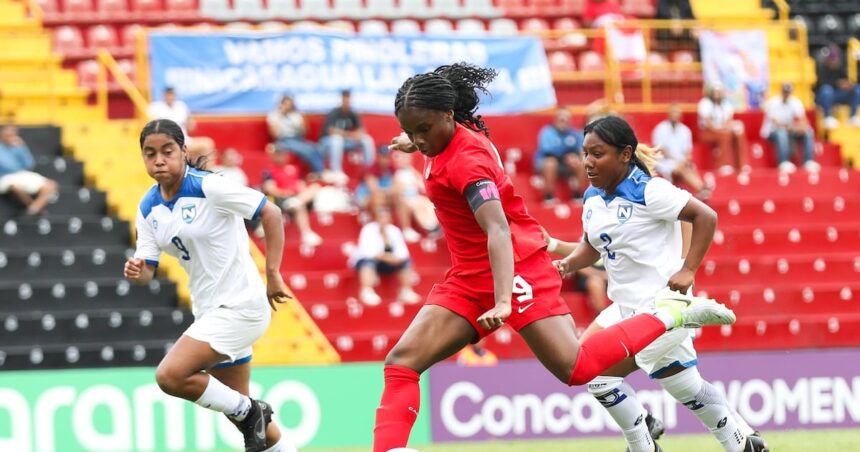In the heart of Canadian soccer’s evolving story, a name increasingly commands attention with each match: Annabelle Chukwu. At just 18, the Notre Dame forward has emerged as not merely a promising talent but a transformative presence for both her university team and Canada’s national squad. Her rise represents more than individual achievement—it signals the next chapter in Canada’s soccer narrative.
When Chukwu steps onto the pitch, the atmosphere shifts. There’s a palpable sense of anticipation, a collective holding of breath as she receives the ball. This isn’t hyperbole; it’s the reality that follows genuine game-changers in sport. Her combination of technical precision, physical prowess, and tactical intelligence defies her youth in ways that have even seasoned observers taking notice.
“She possesses that rare quality where you can see the potential for greatness in real-time,” notes Canada women’s coach Bev Priestman, who has witnessed firsthand Chukwu’s rapid development. “What separates Annabelle is her understanding of space and timing—elements that typically take years to master.”
The statistics reinforce what the eye observes. In her freshman year at Notre Dame, Chukwu netted 11 goals in 19 appearances, earning ACC All-Freshman Team honors. More telling than the numbers, however, is how she accumulates them—with a composure and efficiency that belies her limited experience at the collegiate level.
Her journey to prominence follows the increasingly familiar path of first-generation Canadian athletes with immigrant backgrounds. Born to Nigerian parents who settled in Ottawa, Chukwu’s story reflects Canada’s cultural mosaic and how it enriches the nation’s sporting landscape. Her family’s influence remains evident in her play—a blend of technical European training with the creative flair and physical dynamism often associated with African football traditions.
What truly distinguishes Chukwu from her peers isn’t merely athletic ability, but her cognitive approach to the game. Notre Dame coach Nate Norman describes her as “a student first, who applies that same intellectual rigor to understanding tactical situations.” This mental acuity manifests in her decision-making—the split-second choices that separate good players from potential greats.
The timing of her emergence couldn’t be more significant for Canadian soccer. As the program navigates the post-Christine Sinclair era, questions about who might carry the torch forward have lingered. While it would be unfair to place such expectations solely on Chukwu’s shoulders, her development trajectory suggests she could be a central figure in this new chapter.
“The beautiful thing about Annabelle is that she’s not trying to be the next anyone—she’s creating her own identity,” observes former Canadian midfielder Diana Matheson, who has watched Chukwu’s development with interest. “That authenticity is what allows players to reach their ceiling.”
On campus at Notre Dame, Chukwu balances the increasing attention with the demands of her economics studies. This groundedness seems to anchor her amid growing expectations. Teammates describe a person whose humility and work ethic remain unchanged despite her rising profile in the sport.
The road ahead for Chukwu includes challenges that all promising talents must navigate—maintaining development momentum, avoiding injury setbacks, and managing the psychological aspects of increasing prominence. The history of sports is littered with early bloomers whose trajectories plateaued prematurely.
Yet there’s something about Chukwu’s approach that suggests resilience against such pitfalls. Her play exhibits a maturity that extends beyond technical execution to emotional regulation—rarely appearing rushed or flustered regardless of the stakes or opposition.
As Canadian soccer continues building on the Olympic gold medal momentum, figures like Chukwu represent both the present and future. Her emergence coincides with a critical period of transition for the program, where new leaders must step forward to maintain Canada’s position among the world’s elite.
For fans of Canadian soccer, Chukwu’s development offers a compelling narrative to follow—not merely for what she might accomplish individually, but for what her success could mean for the sport’s continued growth nationally. In a country where hockey traditionally dominates the sports consciousness, soccer’s rising prominence depends on identifiable stars who capture public imagination.
As she continues her collegiate career while balancing national team duties, the question isn’t whether Annabelle Chukwu will make an impact, but rather how significant that impact might become. In a sport where individual brilliance and collective harmony must coexist, she appears uniquely positioned to excel at both dimensions.
Perhaps what’s most exciting isn’t what Chukwu has already accomplished, but what remains ahead—both for her and for Canadian soccer. In her play, we glimpse not just potential realized, but potential still unfolding—a story still being written with each touch of the ball.
For more insights on emerging Canadian athletic talent, visit our CO24 Culture section, or explore broader sports analysis in our CO24 Trends collection.










